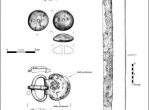Juszkowo
Juszkowo, site 10, Pruszcz Gdański commune, Gdańsk district, site of discovered in 2010 by a team from the Archaeological Museum in Gdańsk of a solitary inhumation grave (fig. 1.) datable to the →Migration Period . Supine burial of a male aged approximately 30 years rested with the head pointing north, presumably originally in a log coffin, with a slab of sandstone placed over hips (apotropaic ritual); at his right side was a spatha sword, Asian type 1 of J. Werner, with an amber bead at the upper part of the blade with below, an incomplete iron brooch (type Hăneşti or a late crossbow tendril variant); there was also a large bronze belt buckle, type Strzegocice-Tiszaládány-Kercz, stamp ornamented in →Sösdala-Untersiebenbrunn Style, with a plating of silver sheet on the pin and rivets and also gilding. Chronology: phase D2. Grave furnishings and anthropological traits (no evidence of artificial skull deformation and of Mongoloid traits) have led researchers to attribute the buried individual to the East Germanic environment →Germanic Tribes influenced by culture of the →Huns . His presence so far North could have been the result of an attempt to control the region, a move possibly inspired by the Huns; alternately, he had returned to his homeland after taking part, presumably under Hunnic →Huns leadership, in wars waged in the south of Europe (this is suggested by elements of a burial tradition unknown to the →Wielbark Culture people who settled this territory during the early →Migration Period and did not deposit weapons in their inhumation graves.
BK
Literature: K. Dyrda, B. Kontny, M. Mączyńska, Ekstraordynaryjne odkrycie grobu wojownika z wczesnego okresu wędrówek ludów w Juszkowie, gm. Pruszcz Gdański, [in:] Księga jubileuszowa prof. Piotra Kaczanowskiego, 2013 (forthcoming).
-
 full resolution
full resolution
Fig. 1. Selected finds from Juszkowo (Dyrda, Kontny, Mączyńska 2013).


